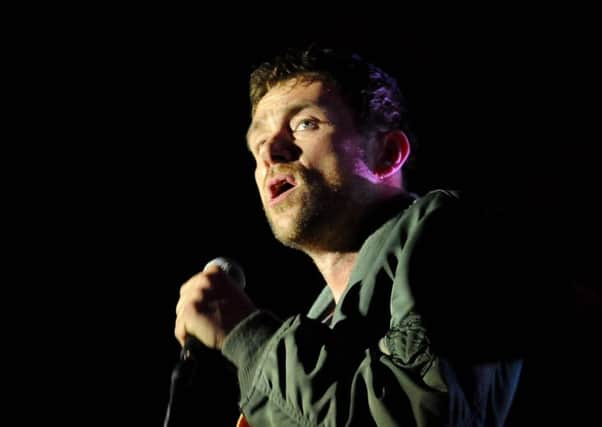Damon Albarn on Blackpool, Brexit and the art of making Merrie


Quite how he manages to carve any time out of his schedule for interviews is a wonder, but Albarn is in relaxed and ruminative mood, content to muse on the fictional kingdom he and his GBQ compadres have created for their newly announced second album, Merrie Land, inspired by Brexit and the bright lights of Blackpool, as he sits on a balcony in Los Angeles.
“A lot of this record was done looking out of windows,” he says. “We rented a corner window studio in one of the dancehalls up near where the Blackpool Tower is, so we had this wonderful open space with lots of light, and you could see part of the Tower from the window and when the westerly wind was coming in, all the seagulls would line up and just float in the air.”
Advertisement
Hide AdAlbarn is a thoughtful songwriter at the best of times and The Good, The Bad & The Queen has already proved a valuable vehicle for his poignant strain of English melancholia, shot through with Simonon’s dub vibrations and Allen’s Afrobeat charms. The self-titled debut was a love letter to Albarn’s native London and the group were poised to follow up with an album of material good to go in 2014. But that was before certain constitutional events overtook them and a lyrical rethink was required.
“Paul has a relationship with a more political music in a different political time, and Tony’s involvement with Fela Kuti … they established their own state within the state of Nigeria,” says Albarn. “So in a sense those two musicians have a cumulative energy about them which informs the world that we inhabit when we’re in the band. In many ways it recalibrates my whole sense of who I am when I’m with them, and on this occasion it inspired us all to try and create a kaleidoscopic moment in an imaginary place called Merrie Land. I think. But I might be talking Californian nonsense…”
Merrie Land also grew out of Albarn’s fascination with piers, those hermetic neon-lit republics with their quaint adherence to the old recreational diversions, yet reaching out beyond our shores to the lands beyond Britannia’s waves. And there are few more iconic piers than Blackpool’s, which provided the backdrop for Merrie Land’s ambiguous and ambivalent celebration of a green and pleasant land.
The impressionistic narrative makes specific references to Blackpool locations such as the promenade pub Uncle Tom’s Cabin, as well as more esoteric allusions to fables and traditions – such as the Dorset Ooser, a masked miscreant from 19th century folklore – collected by Albarn as he made exploratory roadtrips to North Wales, Southend-on-Sea and the First World War cemeteries of northern mainland Europe.
“It was just a joy to travel around and spend the afternoon in some deserted town square somewhere in middle England listening to someone selling strawberries from a stall,” he says.
Albarn has been evoking his Anglo roots in his music since transforming Blur’s fortunes in the early 1990s. But, in much the same way that The Proclaimers can sometimes be characterised as the Caledonian stomp of I’m Gonna Be (550 Miles) to the detriment of their more sensitive laments or romantic ballads, Blur’s plaintive pop or grungey garage elements are often drowned out by the knees-up jollity of Parklife and Country House. Last year, an article in online magazine Vice even posited the idea that Britpop and New Labour’s co-opting of Cool Britannia lit the touchpaper on Brexit.
Advertisement
Hide AdAll of which is unfortunate for a determined internationalist like Albarn, who was one of the high-profile musicians – alongside the likes of Ed Sheeran, Simon Rattle and Jarvis Cocker – to sign Bob Geldof’s open letter to Prime Minister Theresa May, warning that Brexit risked interring British music in a “self-built cultural jail”. Merrie Land takes a more nuanced swipe, in the form of an elegiac break-up letter.
“It’s an emotional response to something that none of us in the band understand, but I think the reason why it works is because it’s not too specific,” says Albarn. “Keeping an open mind and not becoming too insular is really important for all of us. The problem with Brexit is that it set out a utopia, and it’s a utopia that can’t exist anymore. So if we’re in the business of utopias, we have to invent new ones. But the very principle on which the EU was created, that there should never again be war in Europe, is not a bad sentiment to say the least.
Advertisement
Hide Ad“I feel that there are so many more important things for us to get angry about as human beings than this island separation thing. People are just over-enthusiastic to finish everything, all relationships. I think the problem really comes from the idea of a mandate, in retrospective light of all the misinformation that was propagated and the close proximity of the percentage – and that’s not wishing any ill on anybody, it’s just we have got unfinished business in the conversation about it.”
Merrie Land is a deep, enigmatic addition to that conversation, but one that is destined to resonate beyond the borderlands of the Brexit blues.
Merrie Land is released on Studio 13 on 16 November. The Good, The Bad & The Queen play SWG3, Glasgow on 2 December